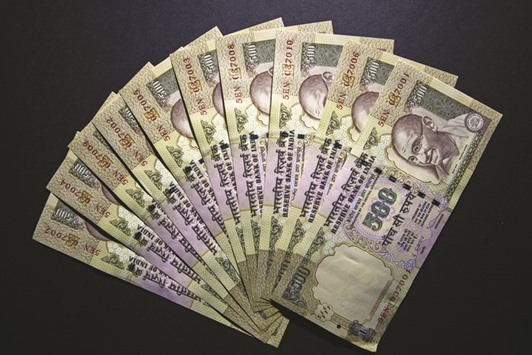India’s rupee reversed gains and bonds declined after a local-language newspaper reported that central bank Governor Raghuram Rajan doesn’t want an extension of his term, though Prime Minister Narendra Modi wants him to stay on.
Rajan has told the government that he doesn’t want to continue as Reserve Bank of India (RBI) chief after his term ends in early September, Bengali-language newspaper Anandabazar Patrika reported yesterday, citing unidentified sources close to Rajan. Modi wants him to continue in the role, according to the newspaper, which is the leading daily in the capital of West Bengal, India’s fourth-most populous state.
The rupee weakened 0.3%, the most since May 24, to close at 67.4525 a dollar in Mumbai, reversing an earlier gain of as much as 0.2%, according to prices from local banks compiled by Bloomberg.
The central bank probably sold dollars to arrest the currency’s slide, three Mumbai-based traders said, asking not to be identified because they aren’t authorized to speak on the matter publicly. “The trigger for the rupee’s drop seems to be the Rajan report,” said Paresh Nayar, Mumbai-based head of currency and money markets at the local unit of South African lender FirstRand. The reaction suggests that investors want Rajan to continue, he said.
The rupee declined 1.4% in May, its biggest monthly loss since January, as foreign funds exited local bonds amid an emerging-market selloff sparked by growing speculation that a US interest-rate increase is imminent.
Indian sovereign bonds also fell yesterday, with the yield on notes due January 2026 rising two basis points to 7.49%, its highest close since March 30, according to prices from the RBI’s trading system.
Alpana Killawala, a central bank spokeswoman, had no immediate comment on the report. Jagdish Thakkar, a spokesman at the prime minister’s office, wasn’t immediately available for comment, and Finance Ministry spokesman DS Malik didn’t respond to two calls on his mobile phone.
A prominent member of Modi’s ruling party has started a campaign to oust Rajan, arguing that his push for a consumer-price inflation target has hurt the economy. Finance Minister Arun Jaitley has declined to comment on Rajan’s future, while denouncing personal attacks on the governor.
Rajan, a former International Monetary Fund chief economist, has boosted India’s foreign-exchange reserves to all- time highs and helped cut rupee swings by more than half since taking office in September 2013.
Besides the inflation target, he’s backed efforts to create a monetary policy committee and strongly advocated fiscal discipline.
The rupee gained earlier in the day as a report showed India’s world-beating economic growth accelerated more than estimated at the start of 2016. Gross domestic product rose 7.9% in the January-March quarter from a year earlier, according to official data released after the close of markets on Tuesday. That was quicker than the 7.5% median estimate in a Bloomberg survey and the 7.2% pace seen in the previous quarter.
The growth trajectory and financial health of Asia’s third- largest economy will keep investors interested in rupee bonds, according to Pacific Investment Management Co, which oversees about $1.5tn in assets globally. Rajan is scheduled to next review monetary policy on June 7. He normally holds a press conference after the decision is made public.

The rupee closed down 0.3% to 67.45 a dollar yesterday
